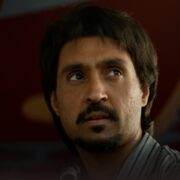THE LAST DUEL: Ridley Scott Attempts Rashomon
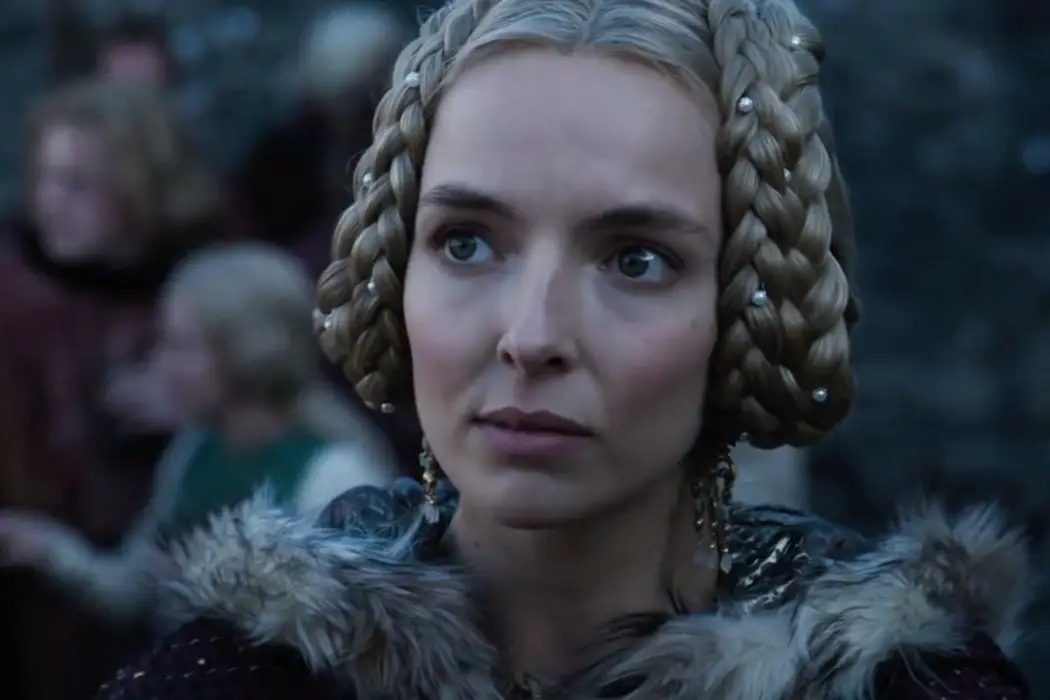
Kevin L. Lee is an Asian-American critic, producer, screenwriter and…
For a filmmaker who has been so clearly defined by the general public as the man who popularized the medieval sword-wielding genre with Gladiator and revolutionized the science-fiction genre with Alien and Blade Runner, Ridley Scott often lives in the shadow of those achievements whenever he sets out to do a new film.
But every once in a while, he would surprise us with a Thelma & Louise or a Black Hawk Down. Even the more recent The Martian, despite it being a return to sci-fi, was surprisingly a breath of fresh air for its handling of tone and pro-science storytelling. These are all titles that seem familiar at first glance but turn out to feel completely new, at least in terms of Scott’s filmography.
A Three-Chapter Structure
The Last Duel sees him returning to the medieval hack-and-slash, and from the very start, he wants us to feel like we’re seeing something new. The proof is in the storytelling and script structure: the film is intentionally outlined as three distinct chapters, told from a different point of view each time. It is a clear attempt for Scott to tell a Rashomon storyline, about the last sanctioned duel in France, as a result of Norman knight Jean de Carrouges (Matt Damon) accusing squire Jacques Le Gris (Adam Driver) of raping his wife Marguerite de Carrouges (Jodie Comer).
The film revolves around this one event, as it’s so clearly marketed in the posters and trailers, with clips and quotes emphasizing Marguerite as the “woman who defied a nation” because she “speaks the truth.” The catch, which ends up being the film’s greatest strength and weakness, is the three-chapter structure forces us to experience a whole lot of other stuff before we get to the crux of the story.
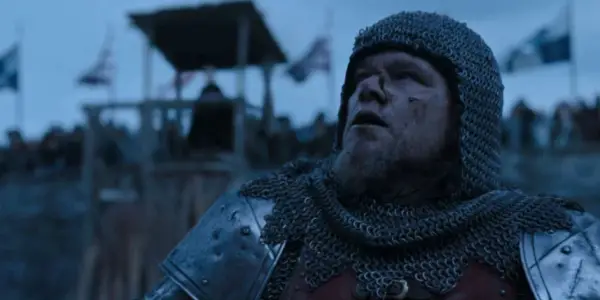
Each chapter is titled “The truth according to […],” and each chapter gives Damon, Driver, and Comer a chance to be the protagonist of the film. Though I enjoy the excitement of revisiting events from a different perspective, I’d argue that the film could be just as effective if the script just chose to be a linear, chronological story that knows when to change subjectivity on the characters. With the screenplay written by Damon, Ben Affleck, and Nicole Holofcener, it’s almost too easy to identify which parts of the film are written by the men and which part is written by the woman.
Great Performances, Interesting Characters, But Enough Reveals?
The benefit of the film’s structure is that we get to see multiple layers to each character and come to understand that the truth is often marred by interpretation. With the first chapter emphasizing Damon’s Jean de Carrouges, it is easy for us to look past his recklessness by holding onto his sense of honor and duty to serve his country and king.
Seeing his initial friendship with Jacques slowly become a rivalry, which is further elevated by Affleck’s scene-stealing drunkard Count Pierre d’Alençon, Jean sees himself as a knight who is constantly wronged every step of the way, and Damon effectively carries that frustration and exhaustion on his face. After all the battles he has fought (for country and money), we can see some idea of where this man is coming from, and certainly, feel the tension bubbling between these men long before the rape even happens.
Of course, our analysis of Jean becomes more sophisticated once we see him as more of a nagging complainer from Jacques’ point of view and a self-centered misogynist blinded by his pride from Marguerite’s point of view. It’s a hilarious but effective handling of a character. Damon, being both a writer and the actor, comes at Jean with a remarkable self-awareness that he’s fighting for a “noble cause” while also just being the absolute worst, unlikable man.
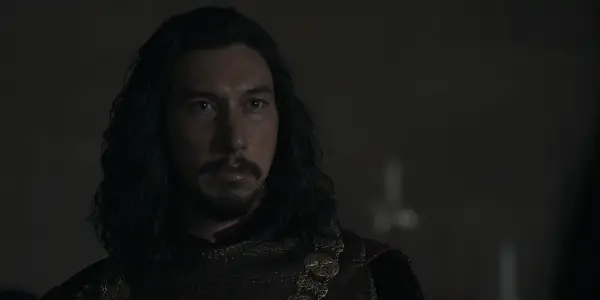
A similar but less effective exploration of character is made through Jacques, whose writing fails him in many ways, leaving it up to just Driver to take the reins. With Driver excelling at playing self-conflicted characters in the past, he gives Jacques a little bit of depth, but the script doesn’t go any further in making Jacques interesting other than he’s a rapist who so strongly believes he isn’t because he feels his love for Marguerite is that real and palpable. Rather than offering him an overwhelming sense of guilt, the script takes him further down the path of denial and self-delusion. With Jacques demonstrating the worst examples of gaslighting (saying that “they” can’t help themselves, as if she is responsible for her own victimization), the film is clear in villainizing him. Though Driver owns his role with conviction, my thoughts go back to why I had to follow this man’s point of view to begin with, if it’s not going to reveal any complicated and nuanced commentary.
It’s when the film finally gives Marguerite the stage in the third chapter that The Last Duel elevates to a tense, emotionally powerful portrait of systemic misogyny. Minor characters who barely had lines of dialogue in the first two chapters finally get to speak here; an effective commentary on how men in power would always overlook the people around them. It is here where Comer really takes over with an Oscar-worthy performance, becomes the film’s strongest presence, and honors the marketing tagline of “the woman who defied a nation.”
Though the script makes a troubling and unnecessary decision to show the rape twice, with a third one being hinted at in a later scene, Scott’s directs these horrific moments in a way that makes us experience her trauma, her isolation, and her desperation to be heard. The camera stays on her, always making us by her side but powerless to help. It gives the film’s final forty minutes a resounding sense of urgency, which eventually leads to the titular battle between Jean and Jacques.
A Riveting Climax with Technical Mastery
By the time we arrive at the climax, Scott finally puts on the big shoes and goes all-in on the medieval hack-and-slash filmmaking. The titular duel is riveting, full of stakes, and shot with a frantic handheld energy that makes you hold your breath.
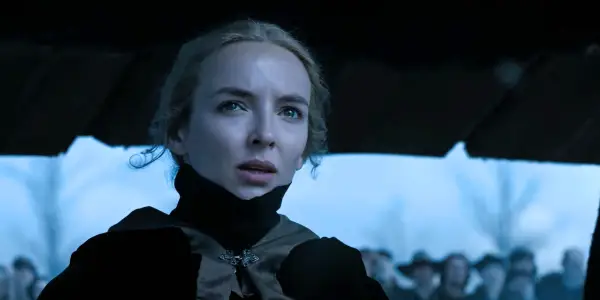
Though the duel only runs for a few minutes in the climax, it’s a sequence that once again demonstrates Scott’s technical brilliance and mastery in fight choreography and sound design.
Damon and Driver are excellent here, as they trudge through the mud with their heavy armor, slowly getting more and more exhausted as the fight goes on. Scott is smart to depict it all with no sense of romanticism; it is dirty, grimy, and ugly, with a large crowd eager to see the outcome. It plays like the exact opposite of the Colosseum fights in Gladiator, with no sense of beauty and glory about it, and the real character we care about isn’t even the one wielding the sword.
The Last Duel: A Fine Enough Return to Historical Epics
Though it never reaches the same glorious heights as Gladiator, The Last Duel is a comfortable return to the medieval genre with tense battle sequences and an urgent takedown of a misogynistic system whose defects are still relevant today.
I question whether the script’s structure actually achieves what the film wants, since there is definitely a more efficient linear script in here that allows us to have multiple protagonists without having to physically jump around via chapters. That being said, the film never drags nor fumbles on its face. We are far from something like Exodus: Gods and Kings.
There is enough dramatic material, excellent performances, and engaging moments of gruesome action that make The Last Duel interesting and compelling to watch from start to finish. I just wish Ridley Scott did a more straightforward medieval story about how men are the worst, instead of meandering around and letting me see and care what the men think, while I sit and wait for the woman to eventually take the spotlight.
Did you see The Last Duel? What did you think of the film? Share below!
The Last Duel premiered at the Venice Film Festival on September 10, 2021. It is scheduled to be released in US theaters on October 15, 2021.
Watch The Last Duel
Does content like this matter to you?
Become a Member and support film journalism. Unlock access to all of Film Inquiry`s great articles. Join a community of like-minded readers who are passionate about cinema - get access to our private members Network, give back to independent filmmakers, and more.
Kevin L. Lee is an Asian-American critic, producer, screenwriter and director based in New York City. A champion of the creative process, Kevin has consulted, written, and produced several short films from development to principal photography to festival premiere. He has over 10 years of marketing and writing experience in film criticism and journalism, ranging from blockbusters to foreign indie films, and has developed a reputation of being “an omnivore of cinema.” He recently finished his MFA in film producing at Columbia University and is currently working in film and TV development for production companies.

